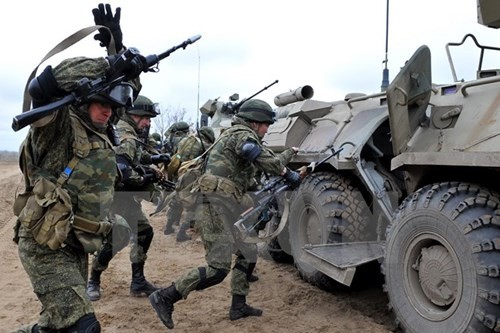(VOVworld) – Russia’s influence in the Middle East has grown, thanks to recent diplomatic and military activities. Analysts say Moscow has made gains in reinforcing its voice and status in the Middle East, where many countries have close relations with the West.
 |
| Russian soldiers (photo: EPA/VNA) |
Russia began its new Middle East policy with its engagement in airstrikes targeting the Islamic State (IS) in Syria in September 2015. Russia’s participation has significantly changed the military situation and wreaked havoc on the IS. Russia and Turkey, a NATO member, have resumed their relations with many detailed objectives. Most recently, Iran has allowed Russian fighter jets to take off from its territory to bomb the IS in Syria.
Russia’s involvement in the Middle East
Since the US and Iran signed their nuclear deal in 2015, the US has reduced its presence there. This has created advantages for Russia as it seeks to affirm its power on the international arena.
Syria is one of Russia’s traditional allies. One year after Russia began its airstrikes against the IS in Syria, it has helped President Bashar al-Assad to retake many areas from the opposition across the country.
Russia accepted Turkish President Tayyip Erdogan’s apology for the shooting down of a Russian Su-24 aircraft over Syrian-Turkish border areas in November 2015. Russian leaders were among the few world leaders who expressed their support for the Turkish President after the failed coup in July. It was seen as a wise move by Russia to court a NATO member who the West had turned its back on.
In mid August, Iran surprisingly allowed Russia to use its Nojeh Airbase to launch airstrikes on IS positions in Syria. Although the use of the airbase was then terminated, it was considered a big compromise in light of what Iran had given the US before the Iranian Revolution of January 1978 - February 1979.
Another development illustrating Russia’s influence in the Middle East was the meeting between the Presidents of Azerbaijan, Iran, and Russia in Baku, Azerbaijan. Vladimir Lepekhin, an analyst with Russian international news agency Rossiya Segodnya, said the Baku meeting marked he turning of a new page in modern geopolitics. He said it was a landmark for the new cooperative format in the Middle East, or at least in the northern part of the Middle East, because the meeting was previously obstructed by forces attempting to take control of the Middle East, which has the world’s biggest oil reserves.
Analysts say Russia’s presence in Syria is a springboard for Moscow to expand its influence in the wider region. Russia hopes to transport fuel to Europe through Turkey instead of Ukraine. In Iran, Russia aims to show off its bombers and military equipment to the potential Middle East market.
The West’s caution
Russia has returned to the Middle East while the US begins its “pivot to Asia” policy and shifted most of its resources to Asia. This has created conditions for other countries, particularly Russia, to fill the void that had been filled by the US for decades.
Despite Russia’s announcement that its moves matched its interest and Russia didn’t aim to defeat the US or any country in the Middle East Issue, the US has expressed its concern. Mark Toner, a spokesman for the US State Department, said the US is looking into Russia-Iran cooperation. The West and the US have skeptically received the information that Russia has suspended the use of Iran’s airbase. American officials and experts said it’s too early to verify that Russia’s have stopped its activities here.
Russia’s activities in some Middle East Countries recently have proved its influence in the hot-spot region. Russia, under the leadership of President Vladimir Putin, has made giant step in rebalancing power in the world.